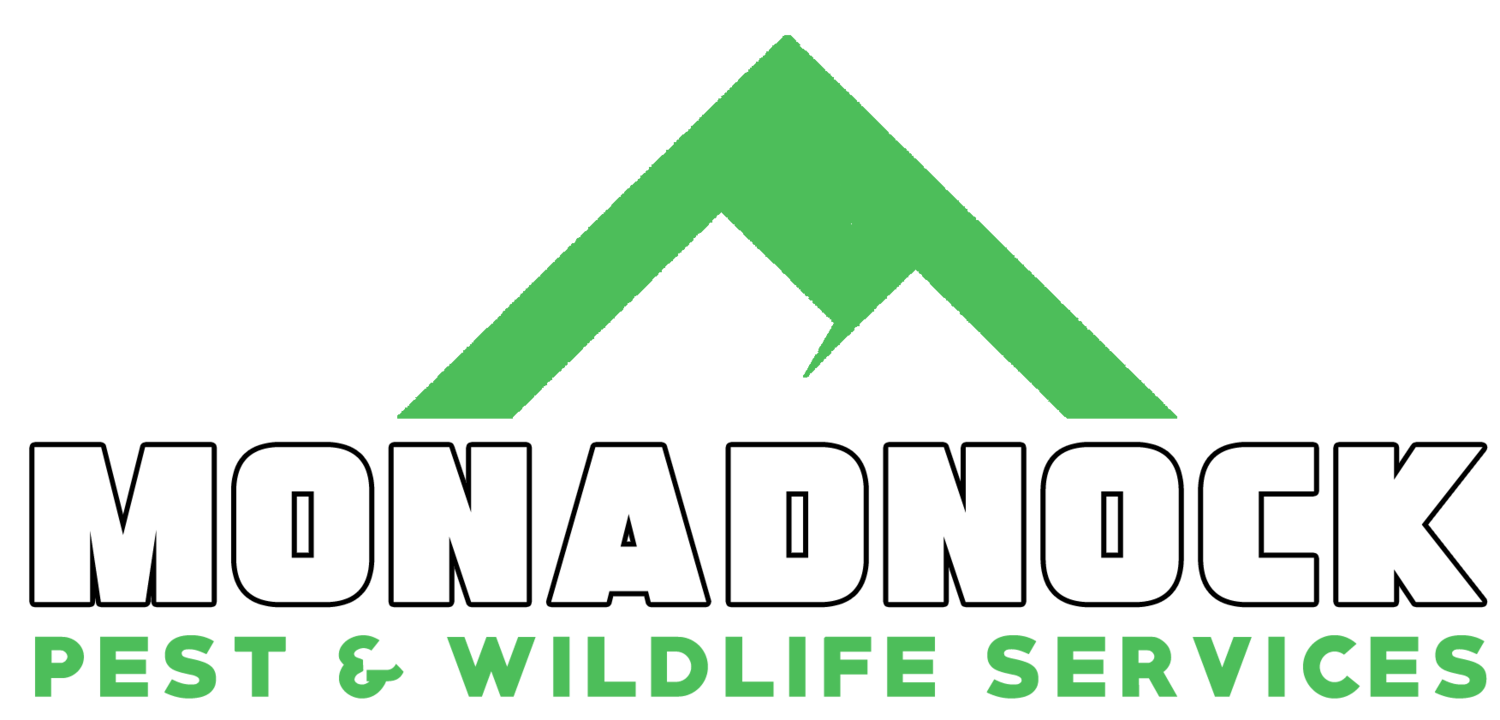
The Striped Skunk
Can’t You Smell That Smell?
The Striped Skunk (Mephitis mephitis) is a common fixture across all of Southern New Hampshire. Once sought after for its fur hide, the skunk now flourishes as an adaptive mid-size mammal thriving in both rural and urban settings in NH.
Monadnock Pest & Wildlife deploys several control tactics to managing skunk conflict - including exclusion/eviction services to remove skunks from a building, as well as trapping and translocation services to completely remove the individual(s) from the property. With well over a decade of skunk handling and trapping experience, we’re the premier skunk management authority in New Hampshire.
Appearance:
Skunks have a fairly small head, short legs, wide rear end, and bushy tail. Front paws include long, curved claws used for digging, similar to that of a badger. Both sexes are colored alike with no seasonal color change. Pelt color is mostly black and white; with the amounts of white striping varying considerably among individuals. Males are slightly larger than female skunks.
Habitat & Diet:
Skunks are found in a variety of habitats from forested woodlands, to agricultural settings, to concrete-laden cities - and everywhere in between.
Skunks tend to prefer natural cavities in rocks, caves, stonewalls, under logs and fallen trees for a den location, and will commonly use abandoned burrows of woodchucks and foxes. Skunks become a nuisance primarily when they seek harborage under sheds, concrete slabs, porches and decks, or inside house crawlspaces and dirt basements. The burrow is anywhere from 2 to 8 meters long and 1 meter underground ending in 1-3 spherical chambers lined with mixed leaves and grass.
Food sources include insects, snails, earthworms, grain, nuts, corn, grasses, leaves, apples, berries, bird and turtle eggs, frogs, snakes, small rodents, trash & human food scraps and carrion. Skunks may also become a noticeable nuisance in the fall, when a drive to fatten up before the cold winter compels them to dig and tear up urban lawns in search of grubs in the undersides of turf-grass.
Breeding & Behavior:
Breeding for skunks commences in February and carries through late March, with males traveling greater distances to court and breed with females. Female skunks will utilize communal dens during the winter months allowing the opportunity for males to breed with multiple mates. Courtship can be rough, with aggressive suitors prompting females to expel their staple musk. Property owners may become aware of a skunk presence in or around their home during this time as skunk musk odor permeates backyards and buildings.
Successful breeding is followed up with a delayed implantation of 19 days and a gestation period of approximately 68 days. Kits (baby skunks) are born in late May to early June in a litter comprising of 4-8 young. A skunk’s infamous musk (a thick gland oil) is present in their scent glands at birth, however the ability for spraying doesn’t tend to take place until a week after birth. Juveniles typically become independent by the fall. The average lifespan for wild skunks in New Hampshire is 2-3 years.
In addition to their notorious musk spray, skunks are known and prolific carriers of several zoonotic diseases; such as Canine Distemper Virus, Rabies Virus, leptospirosis, listeriosis, canine hepatitis, Q-fever, and tularemia. Known predators of skunks include birds of prey (hawks, owls), coyotes, bobcats, and vehicle strikes.
Nuisance characteristics:
Skunks tend to become a nuisance for humans when their presence begins to impede public health and safety. Common nuisance issues include (but are not limited to):
Harborage under sheds, crawlspaces, porches, decks and other structures.
Damage to lawns and turf as a result of grub foraging.
Foul, lingering odor from deposit of musk spray.
Conflict with house-pets.
Safety hazard due to transference of diseases and contamination from waste.
Having trouble with skunks? Think someone’s currently living under your porch, shed, or crawlspace? If you live in southern New Hampshire, we’re ready to assist - contact Monadnock Pest & Wildlife today for a worry-free inspection and estimate to assist with moving your resident skunks along!
Give us a call:
(603)-784-5828
Not much of a phone talker?
Send us a message and we’ll respond to your inquiry shortly.
We check our email messages promptly!



While Valentine’s Day has come and gone for folks in the Northeast, its safe to say romance, and in this case, gland secretions, still linger in the March air for many of the region’s wildlife populations - mainly skunks!